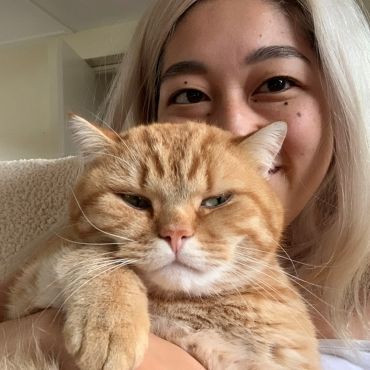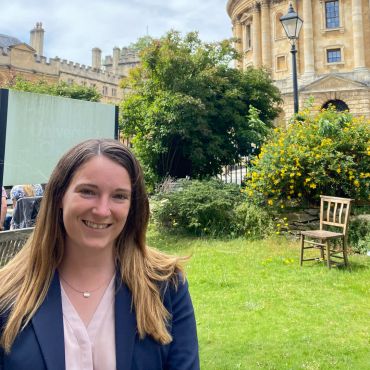
Student stories: Providing student support as a Junior Dean
Junior Deans play a key role in student welfare and college life. It is a complex, varying and demanding role, taken up by Postgraduate students, that balances pastoral and disciplinary responsibilities in a college. They often help to maintain the welfare and wellbeing of students, ensure necessary levels of health and safety standards, and assist college Deans in administering college rules. Junior Deans provide a frontline service during evening shifts and can offer a listening ear and signpost you to appropriate support.
Three current students serving as Junior Deans share how they got involved with student welfare and the opportunities for you to find support or get involved.
Bhadrajee's story | Eri's story | Brenda's story | Recruitment & training
Bhadrajee Hewage
 Tell us about yourself
Tell us about yourself
I'm a second year DPhil student in History, a member of Trinity College and Junior Dean for Mansfield College. I was born in Scotland, but I've lived the majority of my life in the sunny (I wish!) southern suburbs of Dublin in Ireland. I hold an AB in History from Princeton University along with minors in African Studies, Latin American Studies, and South Asian Studies. I also hold a MPhil in Modern South Asian Studies from St. Edmund's College, Cambridge.
How did you get involved with student welfare?
I was involved with residential college life as an undergraduate, so I wanted to find a similar experience while a postgraduate here at Oxford. Becoming a Junior Dean was therefore a perfect way for me to continue making a difference to student life. The role has really enriched my experience at Oxford, and I feel lucky to help contribute to the development and empowerment of other students as they continue their journey and make their way through University life. The role certainly is not to be taken lightly, and there are always challenges in balancing the authority that comes with it. Yet there is a certain satisfaction that comes from helping others during a moment of need or crisis, and this makes it all worth it.
How can students find support or get involved?
There are so many ways to get involved with student welfare at Oxford. The Peer Support Programme, joining JCR and MCR welfare committees, and taking part in the provision of college services are just some of the many ways that students can participate in looking after the wellbeing of themselves and those around them. Support is also offered for every kind of student here at Oxford, whatever their circumstances, so everyone should feel comfortable and welcome reaching out whenever the need arises. And, as always, your Junior Deans will always make themselves available to you. It's what we're here for!
Eri Ichijo
 Tell us about yourself
Tell us about yourself
I’m a final year DPhil student in the Department of Experimental Psychology doing research on pain and autism. I grew up in Tokyo, Japan, and Lausanne, Switzerland.
How did you get involved with student welfare?
I became a Peer Supporter early in my DPhil, because of a call to create department-based Peer Supporters targeted at Postgraduate students. Like many Postgraduates, I spent more time in my department than in my college, so I thought it would be a great way to contribute to the student life. Many of my fellow Peer Supporters went on to become Junior Deans, and that’s how I learnt about such roles. I was immediately interested, because one of my research interests is mental health, and I thought the role would be a great way for me to get a hands-on experience with student welfare.
I became Junior Dean at St Hugh’s College in Michaelmas 2020. COVID-19 was still dictating our lives, so it was a strange time to step into the role. Being a Junior Dean has allowed me to fully take part in college life, including attending fun formals like Burns Night and taking care of two college cats, which I loved! A lot of the calls we get are welfare related, so I became aware of fifth week blues and how difficult it can be for some students during term time. Overall it has been a very positive, although sometimes stressful, experience. Had it not been for the Junior Dean position, I would have finished my DPhil without fully appreciating the complex ways in which academic and welfare needs interact.
How can students find support or get involved?
Being a Junior Dean can be tough sometimes, but I think it is very meaningful work. Calls for Junior Deans go out throughout the year from different colleges, so if you are interested in becoming one, I would regularly check the Conference of Colleges website in ‘support vacancies’. The Junior Dean role differs greatly between colleges (some are discipline only, whereas others are welfare), so I would check before applying.
Brenda McCollum
 Tell us about yourself
Tell us about yourself
I came to Oxford in 2018 for an MSc in African Studies. Having grown up on a dairy farm, in a small town of only 150 people in southeast Kansas, adjusting to life in Oxford and the UK was a challenge. Thanks to the networks available through my department and my college, I found my way and chose to continue with a DPhil in History beginning in 2019.
How did you get involved with student welfare?
Wanting to get involved outside of my degree, from the beginning of my MSc, I volunteered as a Peer Supporter, which introduced me to the welfare system at the college and University levels. Seeing first-hand the need for and impact of college welfare teams, I went on to become a Junior Dean. I’m in my second year of being a Junior Dean at St Hilda’s College, and I can confidently say that this role has led to a shift in my original perceptions of Oxford and the undergraduate experience.
Working with younger students, as a Junior Dean, a Tutor, and as a Graduate Outreach Tutor in the History Faculty, have created some of the most rewarding and most difficult moments of my time at Oxford. Whether working with students in an academic or welfare capacity, seeing them succeed and grow has by far been the most fulfilling aspect of my experiences over the past several years. However, working with students has also meant seeing how much pressure they face during their degrees and striving to help them when they are struggling. Though students most often persevere, the moments when they are unable to do so have been extraordinarily difficult, and the lessons I have learned from those instances will stay with me, for years after I have finished my degree.
How can students find support or get involved?
The most important point I want students to know is that we, as Junior Deans, welcome them contacting us. No issue is too insignificant or too large to bring to your college welfare team. If you don’t know who to contact for support, your Junior Dean is always a good first point of contact. If you want to get involved in supporting welfare, there are always opportunities in your common room, your department, and at the University level, and I encourage you to get involved. Welfare is a team sport, and we could always use more help.
Recruitment and training for Junior Deans
Recruitment for the Junior Dean role occurs throughout the academic year and interested students can look out for jobs on college websites as well as the Conference of Colleges website in ‘support vacancies’.
Junior Dean Training is also available and provided by Dr Tim Knowlson as part of the Peer Support Programme provision in Student Welfare and Support Services. The training happens in September and December over four days, covering all sorts of welfare related topics and scenarios. Find more information on the Oxford Students website. Further queries can be sent to [email protected]. Although the Junior Dean Training started in 1995, it has been modernised to reflect the current Junior Dean role and the nuances of welfare in a collegiate structure.
 Tell us about yourself
Tell us about yourself  Tell us about yourself
Tell us about yourself  Tell us about yourself
Tell us about yourself  Student story: Finding space for Kosovo at Oxford
Student story: Finding space for Kosovo at Oxford
 Oxford students shortlisted as McCall MacBain Scholarship finalists
Oxford students shortlisted as McCall MacBain Scholarship finalists
 Student story: My time at Oxford has been deeply transformative
Student story: My time at Oxford has been deeply transformative
 Welfare blog: Dealing with imposter syndrome
Welfare blog: Dealing with imposter syndrome
 Student story: Rowing sabbatical officer
Student story: Rowing sabbatical officer